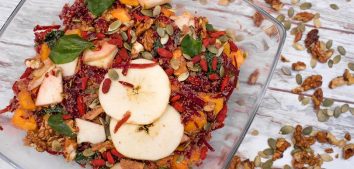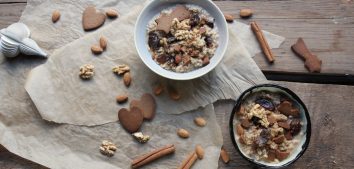
THE ROAD TO HEALTH SERIES: What to Eat Before and After a Workout?
Your interest in the topic of peri-training nutrition doesn’t seem to be fading at all which makes me very happy. For this reason, I decided to discuss the issue in our live meeting yesterday with Łukasz Sieńczewski, a dietician. Below you will find a short summary of the most important issues on the subject ? The challenge continues so I hope you will find this knowledge very useful.
What to eat before a workout?
There’s no ready-made template for a perfect pre-workout meal. The amount of time you have before the workout begins will have a huge impact on the size, type and composition of the meal.
You can have a balanced pre-workout meal (containing protein, carbohydrates and fats) about 3-4 hours before exercising. Then the body will have enough time to absorb and digest it. This way you will replenish glycogen and protein reserves.
If there is less time left before training, choose light foods. The meal should consist of easily digestible carbohydrates and proteins, with reduced amounts of fats and fiber. It can be, for example, a smoothie with a small addition of fruit.
Some of you decide to train first thing in the morning. In this case a small snack is the best choice (e.g. a banana or a protein shake), so as not to burden the digestive tract, and then you have a larger meal after training.
Is it OK to work out on an empty stomach?
You asked a lot of questions during our live session about working out on an empty stomach. We tried to answer them exhaustively. Remember that whether the training can be done on an empty stomach depends on several factors:
- the length of the workout – it should not be longer than 1 hour
- how intense it is going to be
- how fit you are
When you decide to exercise on an empty stomach, have dinner rich in proteins and carbohydrates the day before. Remember also that there is no evidence that training performed on an empty stomach brings better results than the one performed after eating a banana or drinking a shake – also in the case of people struggling with excess weight. You can read more on this topic HERE.
What to eat after a workout?
According to the latest research, the time of the first meal after training is not more important than the general distribution and balance of meals throughout the day, especially if you engage in recreational physical activity (e.g. 3 to 5 times a week with my Diet & Training by Ann application). However, make sure that the break between the meal you had before exercise and the meal after training should not exceed 4 to 6 hours.
What ingredients must your post workout meal contain? Make sure you provide the right amount of protein, the optimal value is from 20 to 25 g of protein after exercise (with more intense training, the value may increase to about 40 g).
The meal should also include carbohydrates necessary for the renewal of energy reserves. As you probably know, it is worth paying attention to the type of carbohydrate, depending on the kind and frequency of training. If you train more than once a day, you can have more simple sugars with high and medium GI; however, if you exercise once a day or less frequently, it is not necessary. If your goal is also to lose weight, choose low GI carbohydrates.
Fats should also complement your meal. There are no precise guidelines for the recommended amount in a post-workout meal. Nevertheless, it is best to choose a healthy dose of vegetable fats such as peanut butter, avocado or linseed oil.
Fat & protein breakfast – yes or no?
Fat and protein breakfast is a meal that has gained in popularity recently. It is low in carbs and is most often associated with eating a lot of eggs and bacon. However, remember that there are hundreds of other products that are also rich in fats and proteins, so we wholeheartedly recommend diversifying this type of breakfast with various other ingredients ?
Will the protein and fat breakfast be better for people who do intense exercise? The answer is not clear: it depends. Why? Well, each of us has a different digestive system. The same thing might be great for one person and not so perfect for others. And that’s not a bad thing at all! I know from my own experience that this type of breakfast does not work for most people who exercise, nor for me. Carbohydrates – most often porridge with fruit – do a much better job for me before my workout. Therefore, you have to answer the question yourself, listening to the needs of your own body.
Summary
There is no perfect recipe for pre- or post-workout meals and nutrition in general. The rules that should be followed are: the distribution of meals during the day, the type of meal adjusted to the time left until training, a balanced meal eaten after exercise (taking into account the appropriate amount of protein, complex carbohydrates and a small addition of fats). If you want to find out more on the topic, read the following posts: HERE and HERE.
Performing training is also associated with adequate hydration – a poorly hydrated body will not handle exercise very well, which will in turn result in its ineffectiveness. Therefore, remember to stay hydrated with water during a workout that lasts up to an hour, and use isotonic drinks during longer training sessions, or shorter, but in unfavorable conditions (e.g. summer, heat).
Remember that the most important thing is to make sure that your diet is balanced and provides all the necessary nutrients. If your physical activity is above average, you should definitely consider visiting a specialist (e.g. a sports nutritionist) who will help you plan the right amount and distribution of meals throughout the day ? The situation is similar when it comes to dietary supplements. If you follow a well-balanced diet, you do not need them but they can provide additional help.










Comments No Comments
Join the discussion…